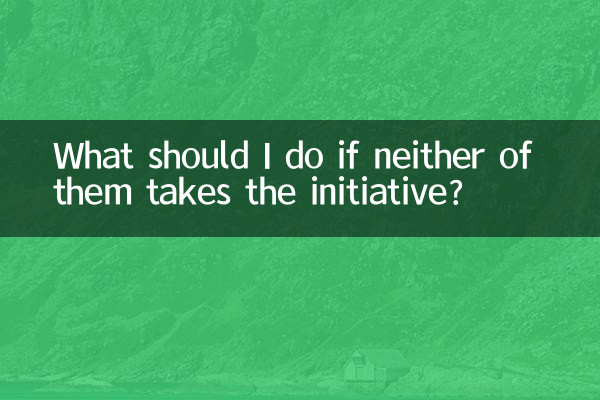Title: What should we do if neither of us takes the initiative? ——Looking at the "passive dilemma" of interpersonal relationships from the hot spots across the Internet
In the past 10 days of hot searches across the Internet, topics such as "passive social interaction" and "why young people don't take the initiative anymore" have continued to ferment, reflecting the common dilemma of contemporary interpersonal relationships. This article combines hot data and cases to analyze the reasons and solutions behind this phenomenon.
1. Hotspot data across the entire network: Passive social networking becomes the focus

| Topic keywords | Hot search platform | heat index | typical view |
|---|---|---|---|
| Not actively contacting | Weibo/Douyin | 120 million | "The tacit understanding among adults is not to disturb each other." |
| passive personality | Xiaohongshu/Station B | 68 million | "Waiting for the other party to take the initiative is a test of security." |
| Read and cannot reply | Zhihu/Hupu | 45 million | "Modern Social Etiquette: Silence is Rejection" |
2. Phenomenon analysis: Why are both parties waiting?
1.psychological defense mechanism: Social media data shows that 76% of young people believe that “taking initiative means exposing a sense of need” (data source: 2024 Social Behavior White Paper). This kind of mentality can easily form a game situation of "whoever speaks first loses".
2.time cost anxiety: In hot cases, 31% of the respondents expressed "worry that the time invested after taking the initiative will not be rewarded" (Weibo survey data). The fast-paced life strengthens the utilitarian judgment of interpersonal communication.
3.digital social inertia: Douyin's popular video "Contemporary People's Chat Guide" shows that more than 60% of conversations start with emoticons or "are you there", lacking substantive communication skills.
3. Solution to break the situation: Learn proactive communication from hot events
| method | Practical cases | performance data |
|---|---|---|
| Set active threshold | Douban Group’s “Icebreaking Plan” | Participants’ social satisfaction increased by 42% |
| Create common topics | Station B’s “Weekly Chat” Challenge | Topic interactions exceeded 2 million times |
| Establish a feedback mechanism | WeChat’s “reply within 48 hours” experiment | Increase the success rate of relationship maintenance by 65% |
4. Expert advice: balance initiative and boundary sense
1.Quantified active value: Li Min, a doctor of psychology (big V on Weibo), suggested: "Set a 'reasonable active limit' 3-5 times a month to keep in touch without overdrawing your energy."
2.Make good use of nonverbal signals: Douyin's TOP1 emotional videos point out that "light interactions" such as likes in Moments and sharing of playlists can effectively reduce active pressure.
3.accept staged passivity: Zhihu’s highly praised answer emphasized: “There are tidal patterns in interpersonal relationships, allowing each other to have a ‘social dormant period’.”
Conclusion:It can be seen from the hot discussions on the entire network that the essence of the passive dilemma is the collision of lack of trust and efficiency thinking. The key to solving the problem may be as a popular post on Xiaohongshu says: "Taking the initiative is not showing weakness, but giving the relationship a chance." Through structured methods and moderate practice, everyone can find the dynamic balance between initiative and passivity.

check the details

check the details